- Home
- News & Features
- News
- FY2019
- TOWARD TICAD 7: ‘Africa & Me’ Part 3 — Mari Miura of the JICA Global Environment Department Fights Desertification With the Countries of Sub-Saharan Africa
News
April 5, 2019
TOWARD TICAD 7: ‘Africa & Me’ Part 3 — Mari Miura of the JICA Global Environment Department Fights Desertification With the Countries of Sub-Saharan Africa
Desertification is the process by which dry regions, through human activity and climate change, become barren, uninhabitable lands. In the Sub-Saharan Africa region, a dry area south of the Sahara Desert where many impoverished people live in reliance on natural resources, a negative chain of events is occurring: Desertification is accelerating because of frequent droughts and the excessive use of natural resources, and poverty is worsening as a result.
"Standing in front of endless brown land in Niger, a farmer said, 'The first rain came and I thought the rainy season had started, but the second week is over and the second rain hasn't fallen.' Hearing the voices of the people living amid these grave circumstances has increased my conviction that something must be done," said JICA staff member Mari Miura of the Global Environment Department.
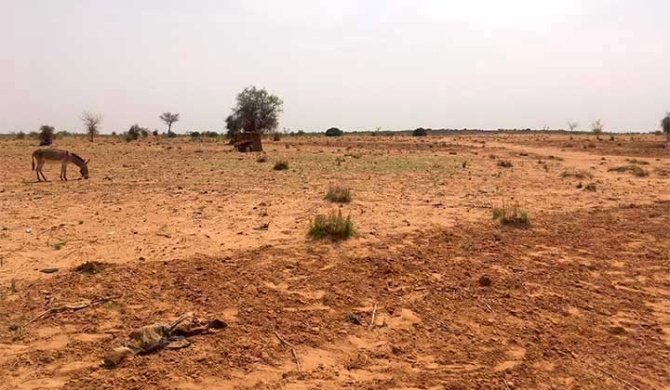 Niger farmland where there are fewer and fewer shrubs to block the wind and erosion has caused desertification to progress. Photo by Mari Miura
Niger farmland where there are fewer and fewer shrubs to block the wind and erosion has caused desertification to progress. Photo by Mari Miura
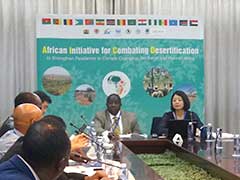 Mari Miura, right, participates in a meeting on the AI-CD in conjunction with the UNCCD COP 13 (in September 2017 in Ordos, China).
Mari Miura, right, participates in a meeting on the AI-CD in conjunction with the UNCCD COP 13 (in September 2017 in Ordos, China).
To solve problems facing Africa, 15 African countries and JICA launched the African Initiative for Combating Desertification (AI-CD), a framework for regional cooperation to encourage measures to cope with desertification, at the sixth Tokyo International Conference on African Development (TICAD VI) in 2016. The United Nations Convention to Combat Desertification (UNCCD), the UN Food and Agriculture Organization (FAO) and other development allies are partners on AI-CD.
This article introduces the efforts of Ms. Miura, who has been involved in the initiative from the start and has worked alongside the countries of Sub-Saharan Africa.
Poverty caused by desertification is a root cause of refugees and terrorism
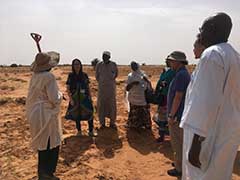 A JICA mission team talks to farmers in a desertified area of Niger.
A JICA mission team talks to farmers in a desertified area of Niger.
"Desertification is not just a problem in Africa," Ms. Miura said. Problems such as poverty, food shortages and a lack of jobs for young people — all caused by desertification — lead to increases in refugees, terrorism and violent extremism. Today, when anyone anywhere in the world could be embroiled in a terrorist attack anytime, combating desertification is an international issue.
"For Sub-Saharan Africa in particular, where development is lagging the most in the world, dealing with desertification is an urgent issue and there is a huge lack of funding and capacity to enforce policy. And compared to other global-scale issues such as climate change and biodiversity, it isn't getting enough attention and assistance from the international community," Ms. Miura said.
That's why JICA called on Kenya and Senegal, where it has long been carrying out cooperation on forestry and nature conservation, to launch AI-CD with JICA in order to create a framework for regional cooperation to work to effectively combat desertification in Sub-Saharan Africa. Through this framework, countries in the region are sharing their knowledge and experience in coping with desertification and receiving the funding they need for concrete projects.
African ownership and partnerships are fundamental
The AI-CD is viable because the 15 participating countries feel ownership of it — each taking a leading role — and because of alliances with their development partners. From its hub countries of Kenya and Senegal, the AI-CD will push each country to explore and find a plan of its own to fight desertification. JICA will play a supporting role.
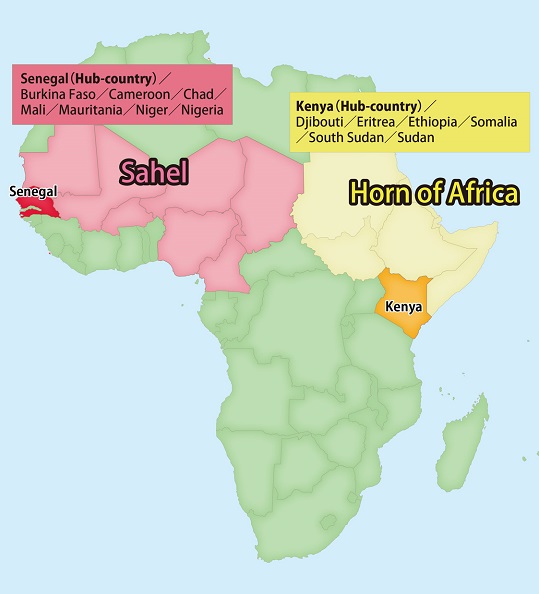 The 15 countries that participate in the AI-CD
The 15 countries that participate in the AI-CD
JICA did something it hadn't really done before, which was to create a mechanism for regional cooperation from scratch together with partner countries and international agencies, rather than implementing a specific project in one country. "We held many discussions with the parties involved about what kinds of activities that can make an impact in the field we would carry out under the AI-CD when there were no specific funds for projects. It was a trial and error process as we did not have many similar experiences before," Ms. Miura recalled.
Despite that, she said, "I really felt the countries' trust in and expectations for Japan and JICA. It was because our collaborators and experts had provided long years of assistance that closely tracked the needs of each country." At one meeting, she said, "Someone from a Horn of African government suddenly took my hand and said, 'We need assistance. Isn't there something Japan can do to help us?'"
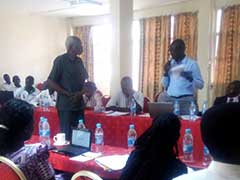 A workshop held in Juba, the capital of South Sudan, in July 2018.
A workshop held in Juba, the capital of South Sudan, in July 2018.
And now, concrete action in the AI-CD is coming into sight. "The AI-CD is putting on workshops to form projects for dealing with desertification in South Sudan, and specific preparations for projects are underway. Building on the momentum of this example, various countries want to form projects and create fundraising processes. I definitely don't want it to end with initiatives consisting of only discussions at meetings," Ms. Miura said.
Looking beyond TICAD 7
At TICAD 7, to be held in August, there are plans to provide opportunities for countries to share updates on their progress in coping with desertification. As preparations for TICAD 7 proceed, the person in charge of AI-CD for Kenya said, "It is important that all countries strengthen their knowledge and be able to form projects and secure funding," and she emphasized the importance of the 15 participating countries marching in step to tackle desertification.
Ms. Miura is already focused on what comes after TICAD 7. "AI-CD aims to have each country implementing specific measures to cope with desertification by TICAD 8 in 2022. I would like to see the implementation of measures by each country. Also, we would like to strengthen our contribution to the countries to fight desertification and sandstorms using Japanese satellite technology and partnerships with private companies," she said.
Desertification is related to all kinds of sectors including agriculture, the environment and gender equality. "The 2030 Agenda for Sustainable Development set forth by the United Nations declares that no one should be left behind. If we cannot cope with desertification, a root cause of poverty, we definitely cannot achieve the SDGs," Ms. Miura said. Her efforts are just beginning.
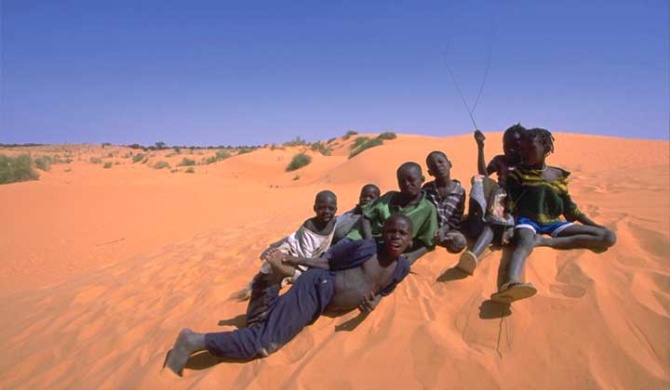 Children who live in a desert area in Burkina Faso
Children who live in a desert area in Burkina Faso
Mari Miura
A staff member of JICA’s Global Environment Department. She joined the Japan International Cooperation Agency in 2005. She started in her current position after working in the JICA Rural Development Department, the JICA Indonesia Office and on secondoment to the International Cooperation Bureau of the Japanese Ministry of Foreign Affairs, and then studying abroad at the Australian National University. She was born in Chiba Prefecture.
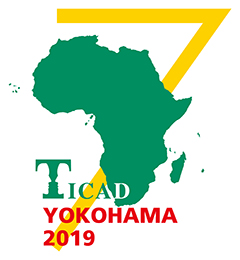
- About JICA
- News & Features
- Countries & Regions
- Our Work
- Thematic Issues
- Types of Assistance
- Partnerships with Other Development Partners
- Climate Change / Environmental and Social Considerations
- Evaluations
- Compliance and Anti-corruption
- Science and Technology Cooperation on Global Issues
- Research
- JICA Development Studies Program / JICA Chair
- Support for the Acceptance of Foreign HRs / Multicultural and Inclusive Community
- Publications
- Investor Relations





